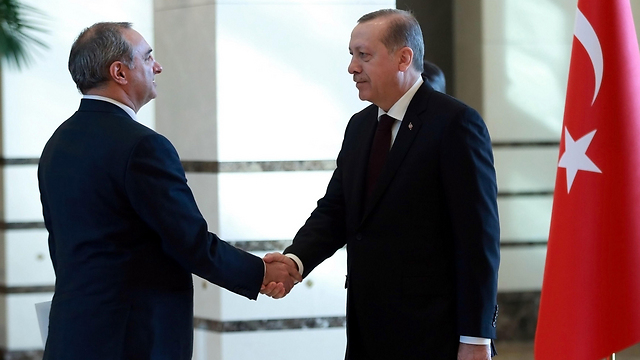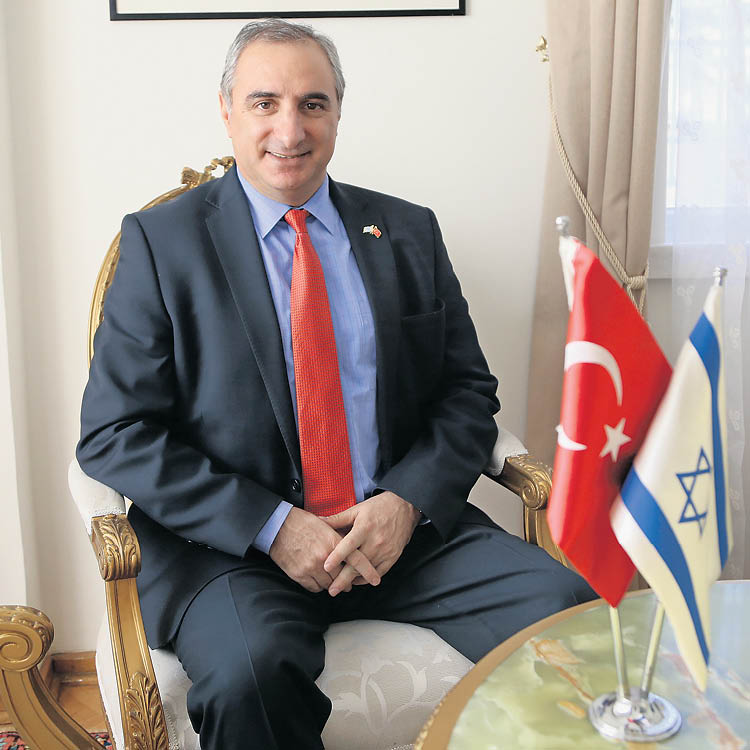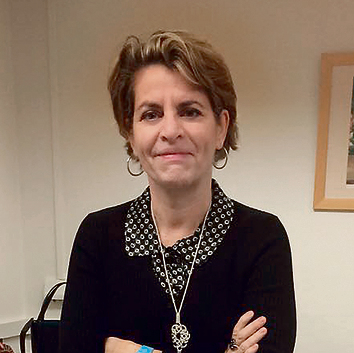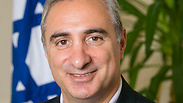
Israel has returned to Turkey in all its glory, says new envoy
For the first time since the Marmara crisis five and a half years ago, Israel has an official ambassador in Ankara. We escorted Eitan Na'eh as he took his first steps in the Turkish capital and watched him present his credentials to President Erdogan. ‘I got a lump in my throat, hearing the Israeli anthem being played at the Turkish president’s palace,’ Na'eh says.
The issue was even raised in a recent phone call between President Reuven Rivlin and Turkish President Recep Tayyip Erdogan, in which Rivlin thanked the Turks for sending firefighting aircraft to Israel in the latest spate of fires. Erdogan requested that initiatives related to the Muslims’ freedom of worship be considered with all due sensitivity. Perhaps he knew that Rivlin was against the bill as well and found a sympathetic ear with the Israeli president.
Erdogan also mentioned the Muezzin Bill in his meeting with Eitan Na'eh, Israel’s first ambassador to Turkey since the Marmara crisis. Five and a half years after his predecessor, Gabby Levy, was expelled from Ankara following the affair, Na'eh presented his credentials to the Turkish president earlier this month. And just as he arrived at the embassy building after the ceremony at the presidential palace, an “Allahu Akbar” call was heard from the nearby mosque. As if someone was trying to stress Erdogan’s message.
When I went out on the streets to hear what the average Turk thinks about the Israeli envoy’s return, the Muezzin Bill issue was raised time and again, without me having to mention it.
Ahmet Inar, a salesman in a cellphone equipment store, said immediately upon hearing that I was from Israel: “Our media reported that you have banned muezzin calls, and that’s wrong. I really hope that you will not enact the muezzin law.”
During the festive reception for Na'eh at the ambassador’s residence, several pro-Palestinian activists held a demonstration outside the building. They were also protesting the Muezzin Bill and chanting “Allahu Akbar.”
But alongside the criticism, the Turks have been going out of their way to embrace the new Israeli ambassador.
Straight from London
In an unusual move, the Foreign Ministry allowed me to escort Ambassador Na'eh as he took his first steps in Turkey, and even attend the ceremony in which he presented his credentials to President Erdogan.
Na'eh arrived in Ankara in the midst of a cold winter. The hills surrounding the city were covered with snow, and the temperature at night reached minus 5 degrees Celsius. But the atmosphere was warmed up by the reactions he received. A seller in one of the stores in the old city, who recognized Na'eh from the television, approached him with a copper bowl filled with cinnamon and lemon-flavored candy. Who would have through that five and a half years after the Marmara crisis, the Israeli ambassador would be welcomed here with candy?
Na'eh, who is very familiar with the Turkish culture and even speaks the language partially, often uses proverbs in Turkish. “The deepest wound will heal,” he quotes the words of a Turkish song, finding similarities to the relationship between the two countries. “There is nothing that cannot be overcome.”
Na'eh really believes that the crisis can be overcome, but he is not deluding himself. Don’t expect fireworks, he says in an interview to Yedioth Ahronoth’s weekend supplement. Let things take their course.
“I’m not underestimating what happened since the Marmara, but I did not share the feeling of desperation that the relations with Turkey were over. You don’t just cross out things in diplomacy. Now we have to define the relations and start advancing cooperation where there is an interest to advance it. I’m not going sky-high. I’m keeping my feet on the ground.”
Na'eh won’t say it, but Israeli officials have made it clear that they will not rush back into the close defense relations the two countries had prior to the Marmara crisis.
“We have been hurt by the Turks. We will have to respect them but suspect them,” says a senior source, implying that security knowledge and intelligence information were leaked to unwanted elements. The days in which Israeli Air Force pilots and Navy officers trained in Turkey are long gone, and will perhaps never return.
A silent memorial to that security relationship remains to this very day at the ground floor of the Israeli Embassy: The rooms of the IDF attaché, his assistant, the representative of the Defense Ministry’s International Defense Cooperation Directorate (SIBAT) and the office of the Israel Police attaché all stand empty, but the signs are still there. In the corner of one of the rooms, someone even forgot an IAF officer’s hat. Today, the rooms are occupied by the economic attaché and the local new-media advisor, who is responsible for tweets and posts in Turkish.
Na'eh, 53, landed in Ankara a few weeks ago straight from London, where he served as deputy Israeli ambassador. He left Britain immediately after the appointments committee made its decision. His wife, Cheryl, stayed behind to pack their entire life in a container, which will arrive in Turkey at a later stage.
A foreign ambassador arriving in Turkey may have to wait somewhere between weeks to months before being invited to present his credentials to the president. Until then, he cannot conduct any public activity and give interviews to the press. But in Na'eh’s case, the Turks did everything in their power to move up the ceremony, which was held four days after he landed in the country. This points to the importance Erdogan ascribes to the normalization of ties with Israel.
The ceremony was held at the “külliye” (“the presidential complex”), the new shiny palace Erdogan built for himself in the heart of Ankara. It’s an enormous compound that includes many buildings, and even a huge mosque with tall minarets that can be seen from nearly every spot in the city. Erdogan has opened it to the public for the Friday prayer in a bid to show that he is not disconnected from the people.
It’s a real palace, with 20-meter (65-foot) high ceilings, green and white marble, and oriental and Western artistic adornments, surrounded by never-ending lawns and gardens, pools and fountains. The rooms include ancient and impressive furniture and many pieces of art, and the pictures on the walls have gold-coated frames. A golden star—the symbol of the presidency—stares at you from every corner. It’s even imprinted on the water glasses. Some $750 million have already been invested in the palace’s construction, and the building is still incomplete.
The television screen at the entrance to the main ceremony area broadcasts images from the failed July 15 coup attempt. Since crushing the coup, Erdogan has been leading a wave of purges. He fired hundreds of thousands of government workers, teachers and military people, claiming that they are affiliated with his rival Fethullah Gülen or to the Kurdish party, leaving as many as one million people with no livelihood or even the ability to flee the country. Erdogan is also silencing any criticism against him, and has pushed for the dismissal of some 1,000 journalists. About 100 of them are in jail after being charged with terror offenses. Journalists fear for their jobs and think not twice but 20 times before tweeting anything negative about the regime.
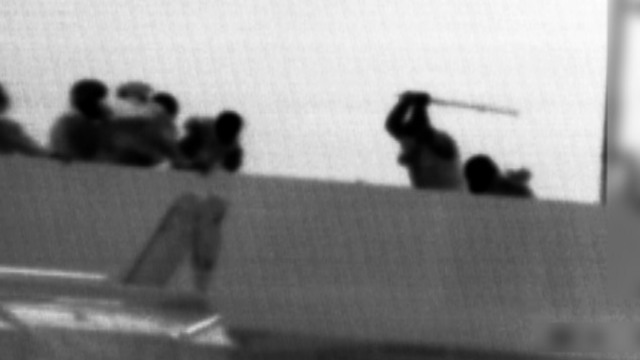
Erdogan built an entire national ethos around July 15. After the coup attempt, he printed fancy books praising the sultan who defeated the conspirers. He gave one of the books to Ambassador Na'eh during their meeting. Erdogan’s picture is displayed on the cover, of course.
When I ask Na'eh about Israel’s stance regarding the purges in Turkey, he seems uncomfortable. The question makes him very uneasy. He doesn’t want to spoil the festive atmosphere around his arrival.
“Israel, in general, rarely intervenes in the internal issues of other countries. We don’t like it when it’s done to us either," he says. "Whoever saw what happened on July 15 understands that something happened and that Turkey experienced a great shock. We must remember that there were democratic elections here and that President Erdogan was elected by a significant percentage of the electorate. Whatever criticism we may have we keep to ourselves and say it when it has to be said.”
The highlight of the presentation of credentials ceremony was the playing of Israel’s national anthem, Hatikva. “I got a lump in my throat, hearing Hatikva at the Turkish president’s palace after everything we had been through,” Na'eh says after the ceremony. “It really was emotional. Israel has returned to Turkey in all its glory.”
Erdogan was smiling and appeared relaxed. When Na'eh told him that his son was about to join the IDF and wanted to be a paramedic, the Turkish leader asked: “And what does his mother have to say about her son going to the army at such an early age? In Turkey, people enlist at the age of 20.”
“She’s worried like any other mother,” Naeh replied.
During the conversation, Na'eh told Erdogan that he was a fan of the Fenerbahçe soccer team. Erdogan immediately whispered in the ear of one of his assistants, and within minutes one of the assistants returned to the room and gave Erdogan a package which he handed over to Na'eh as a gift: A Fenerbahçe tie.
In the diplomatic portion of the conversation, Erdogan presented the bones of contention between the two countries: Turkey objects to Israel’s settlement policy and is committed to the two-state solution. For some reason, Erdogan did not mention Gaza and the Turkish demand to lift the blockade, which appears to have been forgotten since the signing of the reconciliation agreement that, among other things, allows the Turks to bring goods into Gaza almost without any restrictions.
The Turkish president and the Israeli ambassador agreed that the cooperation between the two countries in a variety of areas—including energy and gas—must be advanced. “There are talks on the issue between the two governments and even with private companies as well,” Na'eh reveals. “We want it to happen. There is a mutual desire. It will create a strategic connection between the countries. But it’s still too early to know what will come out of it.”
During the ceremony, Erdogan also mentioned the Jewish community in Turkey, which includes some 5,000 members, saying he ascribed a lot of importance to the relationship with them, even mentioning the community leaders by name. “Turkey is not an anti-Semitic country,” he clarified.
Na'eh updated Erdogan on the increase in the number of Israeli tourists travelling to Turkey. A total of 260,000 Israelis have visited the country since the beginning of the year, compared to 50-100,000 in the year after the Marmara crisis. It’s still far off from the 2008 record of 560,000, but the Israelis are slowly returning to Antalya, Bodrum and Marmaris.
“I left the meeting with a green light to advance the relations,” Na'eh concludes. “I met a president who conveyed warmth, but no one hid the frictions.”
The Turkologists’ club
Na'eh’s first diplomatic mission in Turkey, as a second secretary at the embassy, was from 1993 to 1997. “It was an amazing mission,” he recalls. “At the time, Israel was a positive brand in Turkey and the relationship was blossoming. Within four years, we reached a free trade zone agreement. The two countries' defense establishments developed intimate relations. The defense industries thrived here.”
After his diplomatic mission in Turkey, Na'eh served as deputy consul general in Chicago, and from 2001 to 2005 he was the ambassador in Azerbaijan. During this period, he learned Azeri-Turkish, which is about 80 percent similar to the language used in Turkey. After his time in Azerbaijan, he went on unpaid leave. In 2008 he returned to the Foreign Ministry and, naturally, began working on the Turkish desk. He was later borrowed by the Prime Minister’s Office, where he worked under National Security Advisors Uzi Arad and Yaakov Amidror. In the National Security Council (NSC), he dealt with the Turkish issue quite a lot, including the Marmara events.
“I remember the great sadness. No one wanted to reach this situation, but we were confident that the relations would be restored. The two countries have many shared interests, not all of them overlap. Even during the crisis, the economic relations thrived and the trade reached $5.2 billion a year,” he says.
As part of his work at the NSC, Na'eh was involved in the reconciliation talks with the Turks and participated in two rounds of negotiations. On March 22, 2013, at the end of Barack Obama’s official visit to Israel, Na'eh witnessed the phone call brokered by the American president in which Prime Minister Benjamin Netanyahu apologized to Erdogan.
“It was a Friday. I was on my way to a family vacation in the north, when I was called to Ben-Gurion Airport,” he recounts. “We sat in a caravan and my job was to make sure that Erdogan says ‘kabul ediyorum’ – ‘I accept’ (the apology)”.
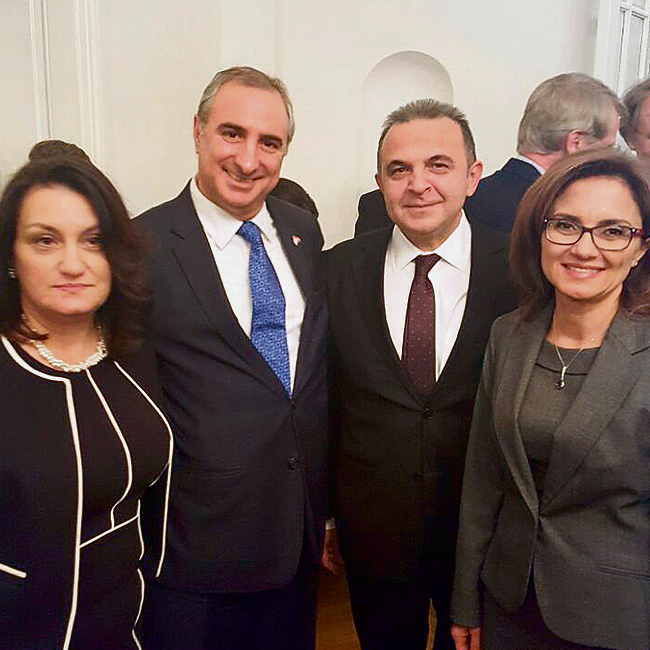
Na'eh is one of those people referred to in the Foreign Ministry as “Turkologists”—senior officials who have served in Turkey at one stage or another of their career and dream of returning to Ankara as ambassadors. There are plenty of reasons for that: The professional challenge, the rich Turkish culture, the Turkish food, and the Turkish people's courtesy. And it’s not like it's easy being an Israeli in Turkey. After all, there are security threats here. The ambassador’s residence and the embassy itself, which is located in an apartment building, look like a fortified military base. Traffic to and from the building is carried out in armored vehicles and escorted by bodyguards.
The embassy’s local team includes 15 to 20 Turkish citizens, some of whom have been working there for decades. Kemal, who is in charge of the embassy’s maintenance, has been there from the age of 14. His father worked there too. Kemal knows a bit of Hebrew and his dream is that “the Israelis will return to Antalya.”
The ambassador’s secretary, Hanna Atias, is a Turkish Jew who has been working at the embassy since 1969, when she was a young girl. “It’s like a family,” says 65-year-old Hanna. She is planning to retire soon, but Na'eh has already announced that he will not let her leave so easily.
The embassy in Ankara was run in the past two years by Amira Oron, who held the title of “chargé d'affaires.” She was here during the attempted coup, heard the warplanes flying low and saw the masses take to the streets to defend Erdogan’s government. “I felt no fear,” she says, “but on the day after, there was a lot of sadness on the streets. It was very traumatic (for the Turks).”
Oron, who was the acting ambassador, prepared the ground for the reconciliation with her deputy, Shani Cooper, a young and highly regarded ambassador whose previous position was head of the Turkish desk at the Foreign Ministry. “It was a very challenging mission and I received a lot of cooperation,” Oron says.
She wanted to become ambassador, but the appointments committee chose Eitan Na'eh. Oron nobly decided to help him in his first steps rather than return to Israel right away. In his reception, Na'eh praised and thanked her warmly.
The ambassador’s residence on Atatürk Boulevard, where the reception was held, is an historical building. It’s actually a castle that was built by the governor of Jerusalem, Djemal Pasha, after Turkey’s defeat in World War I. Atatürk, the leader of modern Turkey, lived a few houses away and used to visit Pasha’s castle to play backgammon and drink coffee. In the late 1960s, the State of Israel bought the impressive building for 2 million Turkish liras, and kept the original furniture and the green marble table on which the “father of modern Turkey” played backgammon. After his arrival, Na'eh visited Atatürk’s grave to lay a wreath, as part of the commitments of every new ambassador in Turkey.
The reception was also attended by Kemal Okem, the first Turkish ambassador to Israel since the reconciliation. When Na'eh and Okem met, they exchanged hugs and kisses. They both have a similar mission: To restore the relations between the two countries, each from his own side.
Like a married couple
Na'eh’s first task is organizing ministerial visits. Energy Minister Yuval Steinitz already visited Istanbul on October 13 and met with his Turkish counterpart, Berat Albayrak, Erdogan’s son-in-law, to discuss the gas deal. And what about a meeting between Erdogan and Netanyahu, I ask the ambassador. “Yavash yavash,” he replies in Turkish (“let’s take it slowly”).
“A meeting with the prime minister is not the beginning of a process, but a move concluding the process,” he says. “You don’t cast a roof without having the support of walls. I hope it will happen during my time in office, but at the right stage.”
Is there a chance we’ll have defense deals again?
“Each thing must be considered individually. In the 1990s, we called it a honeymoon, like a couple. We got to know each other, we got closer, we held hands, and then something happened between the couple and there was a sort of separation. I’m not ignoring what happened. Something painful happened. The Turks hurt us and they were hurt as well. We want to put it behind us. President Erdogan said the same thing. We are now in a reconciliation. We have decided to restore full relations. That doesn’t mean that the interests overlap.”
Would you like to see half a million Israelis return to Antalya after millions of Turks participated in protests against Israel?
“Each person should make his or her own decision. If we return to the numbers of the past, it will be a Turkish achievement. In any event, the Israelis should listen to the recommendation of the relevant officials on visits to Turkey.”
Aren’t you afraid that the relationship will collapse again in the event of another conflict in Gaza?
“Blessed be he who is always concerned. Turkey is a Muslim country. Things have always been sensitive, they still are, and we have to be aware of that. I am aware of the risks, but don’t forget that I came here straight from Britain, where tens of thousands of people participated in two anti-Israel protests during Operation Protective Edge. If another conflict erupts, God forbid, I promise you that thousands of people in London will protest against Israel again. So we should not advance the ties?”
How is Israel seen in the Turkish public opinion? Is Israel hated?
“We don’t think in terms of love or hate. I’m not looking for love at this point. In relations between countries, there should be mutual respect.”
There are those in Jerusalem who believe that the reconciliation with Turkey will be cold, and that we will not return to the intimate relationship of the past.
“We are working on implementing shared interests. No side is doing the other side a favor. I would like to remind you that during the big fire on Mount Carmel, less than a year after the Marmara affair, Erdogan sent three firefighting aircraft to Israel. And he did the same during the recent fires. You call that a cold reconciliation? I have yet to see a country rush to help another country when the relations are cold. Among the people, I see a lot of humanity and warmth.”
Indeed, my conversations with Turkish journalists and citizens on the street gave the impression that the Turks are happy about the reconciliation. Nonetheless, many of them are still very angry with Israel. The Turks are convinced that IDF soldiers massacre children and women in Gaza and in the West Bank on a daily basis. They are being fed with lies and incitement.
“The peace between the two countries is very important,” I am told by Seda, a young woman working in a clothing store in Ankara. “Israel is strong in science and in technology, but it’s important that you use it for good purposes and not against the Palestinians."
Taner Yilmaz, a therapist, tells me that Israel has a negative image in Turkey. “Most people think that you do horrible things to the Muslims and kill Palestinians. It will take a lot of time and effort to change that, but it’s important to reach a reconciliation with Israel. It’s better than war.”
Serkan Demirtas, the Ankara bureau chief of Hürriyet newspaper’s English-language edition, is happy with the reconciliation as well. “It’s very good for the commerce between the countries,” he says. “The weak point is Palestine. Turkey won’t keep quiet in the event of another conflict in Gaza and Israeli aggression. But I’m optimistic, because we Turks forget everything fast.”










